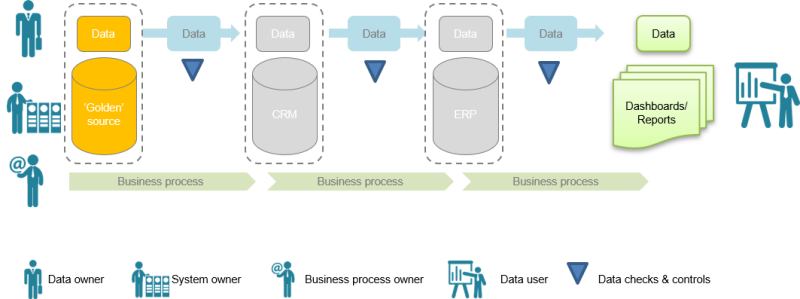As an FP&A professional, you deal with data. Your data travels a long way from its...
 Nowadays a lot of concerns in the business environment are focused around data. There are several drivers for that, such as regulations (e.g. GDPR), the growing amount of data, new technologies in data processing and analysis etc. Many companies recognize data as an asset that has to be managed accordingly. The question remains: who is accountable for managing data within your company?
Nowadays a lot of concerns in the business environment are focused around data. There are several drivers for that, such as regulations (e.g. GDPR), the growing amount of data, new technologies in data processing and analysis etc. Many companies recognize data as an asset that has to be managed accordingly. The question remains: who is accountable for managing data within your company?
The reason why I have chosen the topic was a remark of a CFO of a leading international company (I’d rather not mention the name). He said that one of the serious obstacles to implement artificial intelligence in business planning was the lack of data management, including governance, data integration, and data quality. My first thought was: “Bingo!!! The core areas of data management were mentioned by a finance person!”. I was also surprised, as finance professionals are the main users of data and key stakeholders for data management but nevertheless are not very actively involved in the implementation of data management within their companies.
So, if you are a finance professional, what are the main data-related obstacles and what actions could you take to overcome them?
Understanding the essence of data management
For a start, let’s first define what does ‘managing data’ means.
Everybody in the company is dealing with data on a daily basis. You might have several key questions about your data:
- Where does your data come from and where does it go?
- What does your data mean?
- Who do you need to collaborate with to get quick wins?
- Is the quality of your data good enough?
Data management is a tool to get an answer to these questions.
Make data management a part of your financial world
The main question remains: how could you incorporate data management in your company, and particularly within the finance world? This is the question with which thousands of data management professional are contemplating nowadays.
I will share with you some of my conclusions based on my hands-on data management experience.
Data management set-up means governing, recording and handling of data value chain in your company.
Let’s see what happens with data in your company, how data management provides you with answers to the questions I mentioned above, and what data value chain does mean.
Where does your data come from and where does it go?
When entering your company, data is recorded in several administration systems. For example, a customer put an order for a product and some other relevant information through your company’s website. It will be the first application in the chain where data will be recorded. Then this data will move, for example, into the CRM system where information about all of your customers is collected. Afterwards, it travels into a system that will handle the order and payments and so on. Finally, all the data will end up in a reporting system. This is a process called data flow. As data is located and moves between different applications, we need to have a complete picture of your application landscape.

What does your data mean?
Data undergoes different transformations on its way. If at the end of the chain you report on ‘Total Sales’, it means that you would first need to collect the data on each particular product you have sold.
To understand what happens to data on the way, you need to describe its every step of transformation. You describe data by different means and on different levels of abstraction. For example, ‘Unit price’ is a business term that you could put into the business glossary. Data management and IT specialists will go deeper and describe the same data elements at database levels using logical and physical data models. For an explanation how ‘Unit price’ will become ‘Total Sales’ you will apply some aggregation or transformation rules. Data management and IT specialists will further specify them into business rules and ETLs.
Who do you need to collaborate with to get quick wins?
There are a lot of different people involved in data processing. All activities around data are results of a collaboration between data owners and users. Business process owners maintain the execution of all business activities. For whatever happens to applications and in applications, system owners will need to be responsible. Such a collaboration is a complex system of distributed responsibilities between different business functions. This system is what is called data governance.
Is the quality of your data good enough?
In order to be able to execute your duties as a finance professional, you need to get data of proper quality on time and with required frequency. It means this data would fit with your purpose and correspond with the requirements that you have set up and delivered to data owners. To ensure it, data checks and controls need to be built on the whole path from data origin to their destination.
Organically, we came to a mutual understanding of data value chain, which is a model that describes data movement across the enterprise and links data models, applications, organizations, roles, and data quality checks and controls. The definition is partly built on the definition from the DAMA dictionary [1].
Now you possess the key to incorporate data management in your practice:
The most important for your daily activities data you need to record, govern and then manage a data value chain by linking:
- business processes and roles;
- applications involved in the processes;
- data described in business glossaries and data models;
- data quality requirements, checks and controls.
For those, who are interested in more detailed elaboration on this subject, feel free to consult The Data Management Cookbook available at Amazon.com.
Notes:
[1] – DAMA dictionary, p.141.
Subscribe to
FP&A Trends Digest

We will regularly update you on the latest trends and developments in FP&A. Take the opportunity to have articles written by finance thought leaders delivered directly to your inbox; watch compelling webinars; connect with like-minded professionals; and become a part of our global community.




